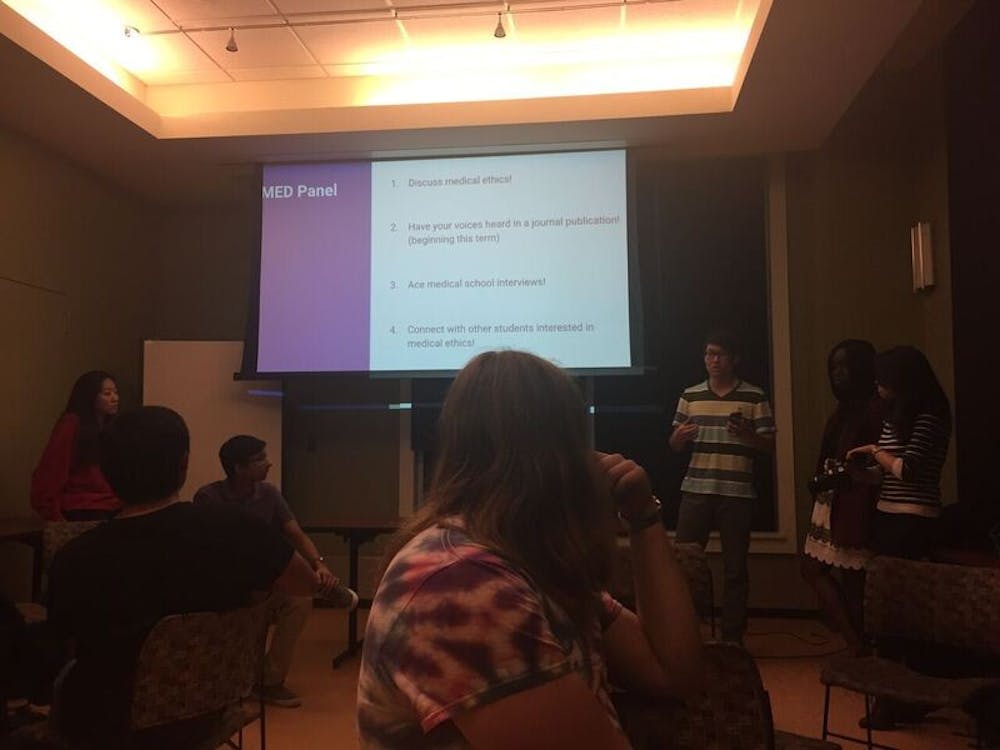The Johns Hopkins Medical Ethics Discussion Panel (MedPanel) hosted a discussion on the ethics of placebo use in clinical trials on Tuesday, Oct. 11 in Charles Commons.
The panel centered around a hypothetical scenario of a clinical trial for Amyotrophic Lateral Sclerosis (ALS) with two groups: the experimental group with a 90 percent survival rate, and a placebo group with a 20 percent survival rate. The standard treatment of care, Riluzole, had a 50 percent survival rate.
Participants separated into four smaller discussion groups, each led by a MedPanel speaker who facilitated conversation. The MedPanel speakers were all undergraduate students who were well-versed in the information. Each group consisted of two to four individuals and allowed participants to express their opinions and expand their perspectives by listening to other people’s points of view.
The speakers presented the topic of placebos and its context in real-world applications of assessing the efficacy of a new drug.
Senior Ketty Liang, the historian of MedPanel, defined the placebo as an intervention that differs from the experimental treatment only by the active principle or component. She then explained the objective of the hypothetical scenario setup.
“We want to give [the placebo] to an experimental group to analyze the pharmacological effects of the drug on that group, and we don’t want to give it to another group, the control group,” Liang said. “By not giving it to this control group, we can then compare the differences and see what the pharmacological effects of this experimental treatment are.”
Members were then asked to imagine this scenario from all three points of view to decide which option they would choose. There was a mix of responses among the four groups. One group reached a unanimous decision to recommend and join the clinical trial while another group had a split perspective on the issue.
Liang explained the crucial role placebos play in medicine.
“I believe that placebos are necessary to ensure that the results of a clinical trial or an experimental drug are reliable,” Liang said.
As a result of the exercise, participants and speakers alike emphasized the importance of thinking about the ethical dilemma from the three different perspectives of physicians, patients and researchers.
Freshman Naisa Rahman acknowledged the possibility of changing one’s decision depending on the point of view that he or she takes.
“I liked how they had hypothetical scenarios where you had to put yourself in the position of the patient, the researcher and then of the physician and see if you would change your decision,” Rahman said.
They also emphasized the weight that a physician’s recommendation carries in terms of whether the patient decides to join the clinical trial and take the risk of being placed in the placebo group, or if he or she decides to take the standard treatment of care.
Junior Amy Clarke touched on the purpose of hosting MedPanel discussions for the Hopkins community.
“This discussion was about [whether] you are willing to take a gamble... with your patient’s life when it comes to putting them in a clinical trial or keeping them on the standard of care,” Clarke said. “It Is about looking into the situations as a physician and thinking about how you would handle it since it is something that you will get into with medicine. These are the sort of things you don’t really think about in a classroom setting here at Hopkins since there are not as many classes that look into that.”
Not only did the participants gain a lot from the meeting, but the leaders of MedPanel did as well. Senior Donghyun Kim, president of MedPanel, commented on how much knowledge he gained from the discussion.
“I thought this discussion would be short and quick because I thought the placebo trials were not that controversial,” Kim said. “But we actually had a lot of great discussion. People had a lot of unique things to say that I never thought of. Every time I am surprised at what I discuss with participants since it always offers an unexpected and unique perspective.”
Liang echoed these sentiments, drawing on the diversity of opinions that allowed the discussion sessions to flourish.
“I have really enjoyed hearing a lot of people’s discussion on what they think is ethical and what they don’t think is ethical, as well as about the different variables that affect one’s ethical decision,” she said.
MedPanel’s mission is to promote dialogue about medical ethics, circulate its journal publication, help students practice for medical school interviews and build connections between students who have a passion for medical ethics.























Please note All comments are eligible for publication in The News-Letter.